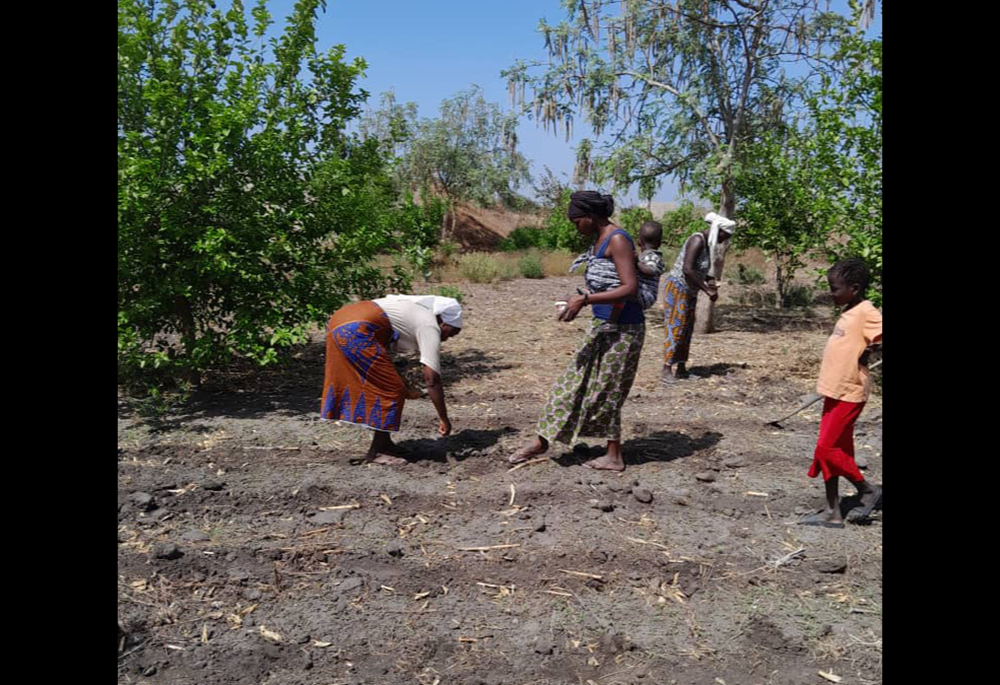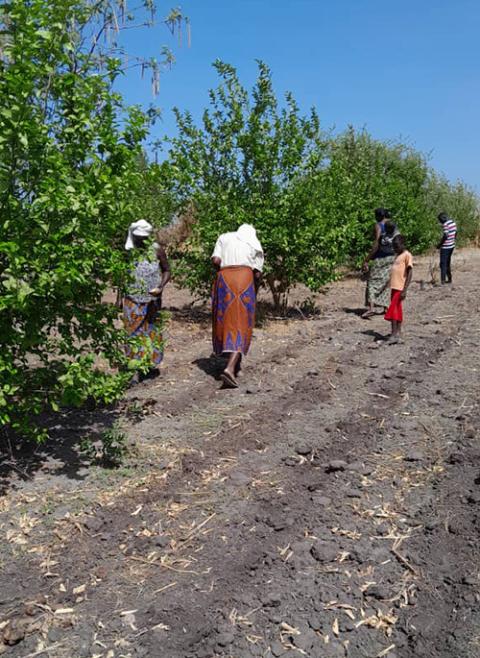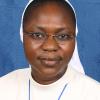
Sr. Augustine Adioye prepares the land for market gardening with the women of the village of Mbodiene in Senegal. (Sr. Pepyne Claudia Matendakama)
The Congregation of the Daughters of the Immaculate Heart of Mary, in Senegal, was founded for the evangelization of Africa, and is one of the first indigenous congregations on the continent. Our founding, in the aftermath of slavery, was a testament to the dignity and value of Black people, particularly Black women, in the future development of the region.
At the time of our founding, the white missionaries were unfamiliar with the languages, customs and ways of life in the region. They struggled to adapt to the climate and often didn't know how to effectively approach the indigenous populations.
The sisters became formidable allies, assisting them in the field by translating, teaching catechism, and accompanying the priests to help communicate the message. Their efforts were particularly focused on women and children, playing a vital role in shaping the first Christian generations. During a time when being a nun was not easy, the first sisters embraced their role with dignity, which empowered them to assist and uplift other Black women.
Bishop Aloyse Kobes, our founder, was a French Spiritan cleric and the first apostolic vicar of Senegambia — a part of West Africa between the Senegal and Gambia rivers. He was a visionary man, deeply invested in what we today call integral and sustainable development. He developed a theological approach that, alongside the spiritual dimension, considered the economic, societal and environmental aspects of the evangelizing mission that he shared with us.
In the 1860s he established a variety of trades in Ngazobil, a coastal town south of Dakar, including agriculture, blacksmithing, printing, and animal breeding. The sisters also contributed to guiding the people in these trades, with a focus on promoting their economic development. Their care extended not only to the soul but also to the body and mind.
Today, faithful to our founding charism, we continue to embrace various aspects of sustainable and integral development, investing in agriculture projects, livestock rearing, education, health care, environmental protection, and support for families.

Sr. Augustine Adioye sows millet in the village of Mbodienne in Senegal. (Sr. Pepyne Claudia Matendakama)
In the villages of Mbodiene, a town on the coast of Senegal, and nearby Pout, our sisters have successfully established an ecological chain of fish farming, market gardening, citrus fruit cultivation, and livestock breeding. Using locally grown vegetables and fruits, we produce a range of popular organic products that generate income, including spices, soaps, dermatological ointments, herbal teas, and oils. These activities are carried out alongside the women of the villages. Through these efforts, we create jobs on a small scale and contribute to healthy eating.
Our work extends beyond Christians, who are a minority in our country, to include those practicing Islam, the majority religion, as well as groups that follow indigenous beliefs.
We face numerous challenges in the areas of agriculture, environmental protection, and health care, with the primary one being a lack of resources. We would like to produce in larger quantities; train, and employ many women to help them overcome poverty; contribute to environmental protection; promote food self-sufficiency, and encourage good nutrition by producing and consuming organic food without degrading the environment through sustainable farming practices.
However, we currently operate on a small scale due to limited resources. We aspire to expand our efforts and reach as many people as possible because we see the difference we are making.
In the villages of Mbodiene and Pout, women are the primary beneficiaries of our commitment to agriculture. They benefit from our fruit and vegetable products, and we also support their health, focusing on mothers and children. The sisters provide nutrition education to help children grow strong and healthy. They train women in child nutrition and produce organic flour, natural spices, organic soaps, and ointments for family well-being. We also conduct talks and raise awareness on malnutrition in dispensaries and schools.
Senegal is one of the Sahel countries of West Africa, where rainfall is rare, and cooking fuels are scarce. Over the years, deforestation for firewood has worsened the region's dry conditions, increasing the risk of desertification. To counter this threat, we promote reforestation, teaching people the importance of planting trees to restore the land.
To raise awareness of our shared responsibility to fight pollution and unsanitary conditions, the sisters organize environmental cleanup days. Women, schoolchildren, youth, and community leaders form groups to clean the beaches, which are a source of pride, and sort recyclables from waste in schools and neighborhoods.
Advertisement
In 2022 we chose "The Culture of Care" as a theme for our congregation. Across our communities of more than 300 sisters in 10 countries, including France, we educated ourselves on ecological practices — ways to save water and electricity and avoid plastics. We committed to promoting a culture of self-care, care for others, care for the environment, and care for our relationship with God, because we believe "everything is connected."
We have also enthusiastically embraced Pope Francis' words in "Laudato Si', on Care for Our Common Home":
When we fail to acknowledge as part of reality the worth of a poor person, a human embryo, a person with disabilities — to offer just a few examples — it becomes difficult to hear the cry of nature itself; everything is connected. Once the human being declares independence from reality and behaves with absolute dominion, the very foundations of our life begin to crumble, for "instead of carrying out his role as a cooperator with God in the work of creation, man sets himself up in place of God and thus ends up provoking a rebellion on the part of nature" [quoting Pope John Paul II's Centesimus Annus].
Our congregation is part of the Laudato Si' Movement, which was seriously considered at our general chapter in July. The theme for this year was "Pilgrims of Hope: With Mary, Let Us Walk Together, Proclaiming the Gospel of Creation for Integral and Sustainable Development."
Before the chapter, we established a commission on justice, peace and the integrity of creation. The commission is responsible for training, raising awareness, gathering information on activities related to integral ecology, and carrying out various initiatives.
We engaged in extensive work before and during the chapter, focusing on the gospel of creation and integral development. The sisters received training in integral ecology, learning how to promote ecological conversion and implement daily ecological gestures.
Looking ahead, our congregation is exploring several new projects and initiatives in response to the guidelines established during the general chapter. These guidelines include living in a constant attitude of listening to God and the cries of humanity, entering more deeply into the daily prayer of Jesus, witnessing fraternity as a sign and proclamation of the kingdom, and walking together in the institute and the church under the benevolent gaze of the Virgin Mary.
We want to be pilgrims of hope in a world of despair, proclaiming the gospel of creation to establish a culture of care and love. Additionally, we are committed to working for integral human development by paying attention to the poorest, and protecting life, goodness and beauty to create a more humane world.
We are praying together as a community for the grace to welcome the world as a "sacrament of communion" and for global and universal fraternity.






